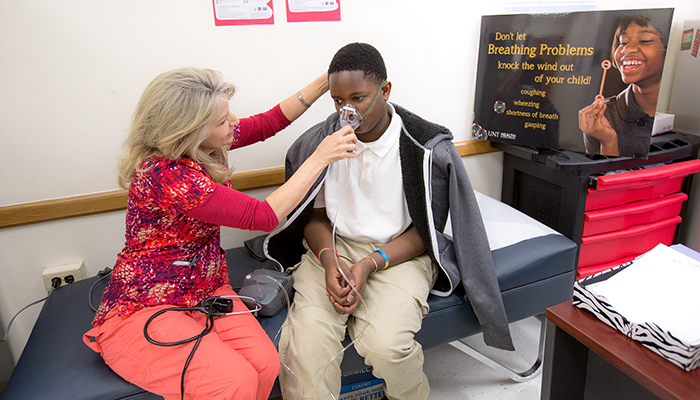Helping kids cope with asthma emergencies at school
By Betsy Friauf
A slam-dunk pilot project does more than win awards and put up great numbers. It makes a difference in people’s lives.
That’s the case with “Asthma 411,” a collaboration between UNT Health Science Center and Fort Worth Independent School District. Nationally, 9.3 percent of children have asthma. In sad contrast, by age 9, one-quarter of Tarrant County kids have been diagnosed with it.
The Asthma 411 project allowed school nurses to keep breathing-treatment equipment in their office and, with parents’ prior permission, give kids a treatment during an asthma attack – preventing most 911 calls and emergency room visits for these children, and greatly reducing absences.
The project began when the Health Science Center’s Professional and Continuing Education office called FWISD Trustee Tobi Jackson, who helped make introductions and get the program off the ground.
It changed the landscape for Forest Oak Middle School Nurse Andrea Smith.
“It often happens that even if a child has an inhaler, it’s been left at home or it’s empty,” she said. “When you have a child in your office gasping for breath for 15 to 30 minutes while you wait for someone to arrive with an inhaler, or for a Medstar ambulance, you just hurt for them. It gave me peace of mind knowing I had an intervention to help the child.”
The pilot program concluded in 2015. The Health Science Center continues to investigate potential funding sources to re-introduce and expand Asthma 411 in collaboration with FWISD.
During the pilot at two schools, Eastern Hills Elementary and Forest Oak Middle, results were impressive:
- Calls to 911 for asthma emergencies fell from 19 to 1.
- Asthma-related absences dropped 51 percent.
Asthma 411 has earned national recognition as well. It was selected for the 2016 Award for Outstanding Innovation in Continuing Professional Development by the Alliance for Continuing Education in the Health Professions (ACEhp). These awards recognize exceptional professionals and leaders paving the way to improve patient care through education. The project was funded with grants from GlaxoSmithKline and Boehringer Ingelheim, as well as support from the Health Science Center.
Smith admits she resisted the project at first: “It seemed like a lot of record-keeping.” But that was remedied by UNTHSC participants.
UNTHSC student Leslie Allsop, MSN, MPH, and David Sterling, PhD, Chairman and Professor of Environmental and Occupational Health, “made the records as easy as possible so I could concentrate on helping the children be healthier,” Smith said. “I hope Asthma 411 can be implemented in all the schools.”
To learn more about Asthma 411, contact Andrew Crim, UNTHSC Executive Director of Professional and Continuing Education.







Social media